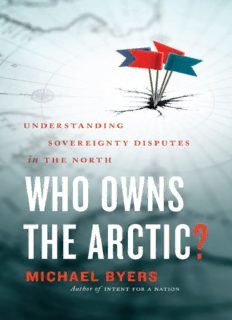
Who Owns the Arctic?: Understanding Sovereignty Disputes in the North PDF
Preview Who Owns the Arctic?: Understanding Sovereignty Disputes in the North
Who Owns the Arctic? WHO OWNS THE ARCTIC? UNDERSTANDING SOVEREIGNTY DISPUTES in THE NORTH MICHAEL BYERS Douglas & McIntyre D&M PUBLISHERS INC. Vancouver / Toronto / Berkeley Copyright © 2009 by Michael Byers First U.S. edition 2010 09 10 11 12 13 5 4 3 2 1 All rights reserved. No part of this book may be reproduced, stored in a retrieval system or transmitted, in any form or by any means, without the prior written consent of the publisher or a licence from The Canadian Copyright Licensing Agency ( Access Copyright ). For a copyright licence, visit www.accesscopyright.ca or call toll free to 1-800-893-5777. Douglas & McIntyre An imprint of D&M Publishers Inc. 2323 Quebec Street, Suite 201 Vancouver BC Canada V5T 4s7 www.douglas-mcintyre.com Library and Archives Canada Cataloguing in Publication Byers, Michael, 1966– Who owns the Arctic? : understanding sovereignty disputes in the north / Michael Byers. ISBN 978-1-55365-499-5 1. Arctic regions—International status. 2. Arctic regions — International cooperation. 3. Canada — Boundaries— Arctic regions. 4. Arctic regions—Boundaries —Canada. 5. Jurisdiction, Territorial— Arctic regions. 6. Environmental protection —Arctic regions. I. Title. FC191.b93 2009 341.4’209719 C2009-904549-4 Editing by Barbara Pulling Cover and text design by Ingrid Paulson Cover photographs by iStock and Janis Christie/Getty Images Maps are from “Canada’s Unresolved Maritime Boundaries” by David H. Gray, IBRU Boundary and Security Bulletin, Autumn 1997. Used with permission. Maps by Paul Edmunds. Printed and bound in Canada by Friesens Printed on acid-free paper that is forest friendly ( 100 % post-consumer recycled paper ) and has been processed chlorine free Distributed in the U.S. by Publishers Group West We gratefully acknowledge the financial support of the Canada Council for the Arts, the British Columbia Arts Council, the Province of British Columbia through the Book Publishing Tax Credit and the Government of Canada through the Book Publishing Industry Development Program ( BPIDP ) for our publishing activities. Contents ACKNOWLEDGEMENTS Introduction ARE THE RUSSIANS COMING? One WHY SOVEREIGNTY MATTERS Two WHO OWNS HANS ISLAND? Three AN ICE-FRFE NORTHWEST PASSAGE Four THE NORTHWEST PASSAGE IN CONTEMPORARY POLICY Five NEGOTIATING OVER THE NORTHWEST PASSAGE Six WHO OWNS THE SEABED? Seven SOVEREIGNTY AND THE INUIT Conclusion AN ARCTIC FOR EVERYONE Appendix I A NORTHWEST PASSAGE SCENARIO Appendix II MODEL NEGOTIATION ON NORTHERN WATERS NOTES RECOMMENDED WEBSITES RECOMMENDED READINGS Acknowledgements MY FIRST CHILDHOOD memory is of my father, a federal government scientist, returning from an expedition to Polar Bear Pass on Bathurst Island with a new, very bushy beard. That memory is partly responsible for my passion for the North. I thank Bob Byers for that, and for having read and commented on every page in this book. I am also grateful to Suzanne Lalonde of the Université de Montréal. We have sailed the Northwest Passage, debated all the legal technicalities of that waterway, and co-authored several articles. In one sense, she is the co-author of this book, too, for she has profoundly influenced my thinking. A number of other friends and colleagues have provided much valued input on different sections of the manuscript: David Gray, formerly of the Canadian Hydrographic Service; Rob Huebert of the University of Calgary; Ron Macnab, formerly of the Canadian Geological Survey and Canadian Polar Commission; James Manicom of the University of Toronto; Ted McDorman of the University of Victoria; Don McRae of the University of Ottawa; and Justin Nankivell of the Asia-Pacific Center for Security Studies in Honolulu. Tony Penikett, the former premier of the Yukon Territory and chief devolution negotiator for the Government of Nunavut, has been generous with his time. So too has Thomas Berger, retired judge, commissioner in the Mackenzie Valley Pipeline Inquiry and conciliator in the ongoing dispute over the implementation of the Nunavut Land Claims Agreement Act. Travelling in the Arctic is expensive and logistically challenging. I am grateful to Bill Rompkey and his colleagues on the Standing Senate Committee on Fisheries and Oceans for taking me on their tour of Nunavut in 2008. I am also grateful to Jack Layton, the leader of the federal New Democratic Party, who took me on his northern tour the previous year. My research has been greatly facilitated by two grants from ArcticNet, a federally funded consortium of scientists from twenty-seven Canadian universities and five federal departments. Thanks to ArcticNet, I was able to spend eleven days on the Canadian Coast Guard research icebreaker Amundsen during its historic late-season voyage through the Northwest Passage in October 2006. Louis Fortier and Martin Fortier, the research and executive directors of
Description: